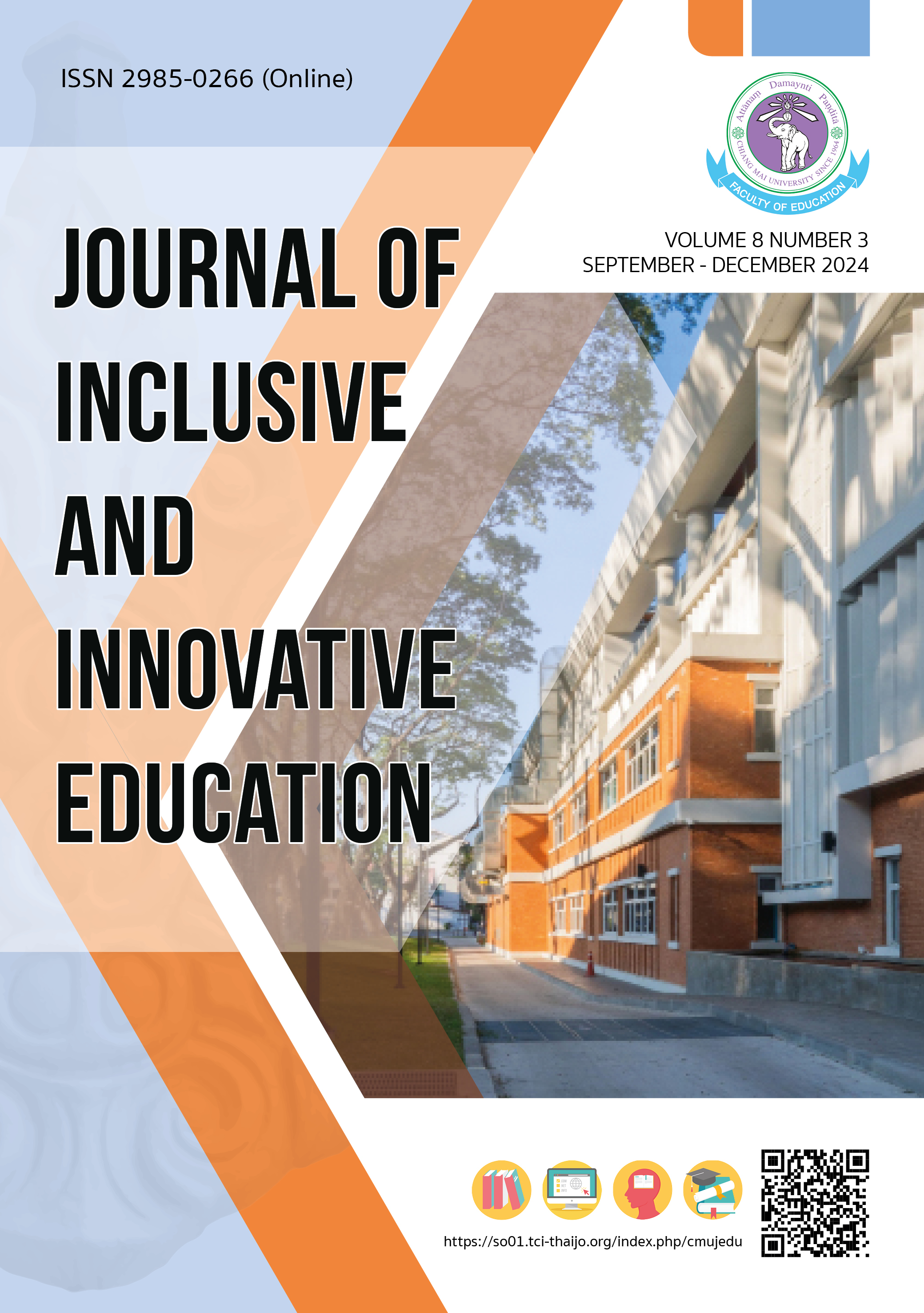ผลการจัดกิจกรรมการเรียนรู้โดยใช้กลวิธีการทำนาย-สังเกต-อธิบายร่วมกับสถานการณ์จำลองคอมพิวเตอร์ เพื่อแก้ไขแนวคิดคลาดเคลื่อนเกี่ยวกับไฟฟ้าของนักเรียนระดับชั้นมัธยมศึกษาปีที่ 5
Main Article Content
บทคัดย่อ
การวิจัยนี้มีวัตถุประสงค์เพื่อ 1) ศึกษาผลการจัดกิจกรรมการเรียนรู้โดยใช้กลวิธีการทำนาย-สังเกต-อธิบายร่วมกับสถานการณ์จำลองคอมพิวเตอร์ (POE+CS) เพื่อแก้ไขแนวคิดคลาดเคลื่อนเกี่ยวกับไฟฟ้า 2) เปรียบเทียบความเข้าใจเกี่ยวกับไฟฟ้าของนักเรียนก่อนและหลังการเรียน และ 3) ศึกษาความพึงพอใจของนักเรียนต่อกลวิธี POE+CS ระเบียบวิธีวิจัยเน้นการวิจัยกึ่งทดลองแบบกลุ่มเดียวทดสอบก่อนและหลัง โดยกลุ่มผู้เข้าร่วมวิจัยเป็นนักเรียนชั้นมัธยมศึกษาปีที่ 5 จำนวน 44 คน จากโรงเรียนแห่งหนึ่งในกรุงเทพมหานคร เครื่องมือวิจัยประกอบด้วย 1) กิจกรรมการเรียนรู้โดยใช้กลวิธี POE ร่วมกับสถานการณ์จำลองคอมพิวเตอร์ Phet ประกอบด้วย 5 สถานการณ์ ครอบคลุมแนวคิดคลาดเคลื่อนเกี่ยวกับไฟฟ้าจำนวน 9 แนวคิด 2) แบบทดสอบแนวคิดเกี่ยวกับไฟฟ้า และ 3) แบบสอบถามความพึงพอใจ ผลการวิจัยพบว่า 1) การจัดกิจกรรมการเรียนรู้โดยใช้กลวิธี POE ร่วมกับสถานการณ์จำลองคอมพิวเตอร์ Phet สามารถช่วยแก้ไขแนวคิดคลาดเคลื่อนเกี่ยวกับไฟฟ้าของนักเรียนให้ถูกต้อง 2) ร้อยละของจำนวนนักเรียนมีความเข้าใจแนวคิดเกี่ยวกับไฟฟ้าหลังเรียน (ร้อยละ 80.3) สูงกว่าก่อนเรียน (ร้อยละ 55.1) ในภาพรวม และ 3) นักเรียนมีความพึงพอใจต่อกลวิธีการเรียนรู้ในระดับมาก โดยเฉพาะด้านเนื้อหาการเรียนรู้และองค์ความรู้ที่ได้รับ ผลการวิจัยนี้แสดงให้เห็นว่าการใช้กลวิธี POE ร่วมกับสถานการณ์จำลองคอมพิวเตอร์ Phet เป็นวิธีที่มีประสิทธิภาพในการพัฒนาความเข้าใจเกี่ยวกับไฟฟ้าของนักเรียนชั้นมัธยมศึกษาปีที่ 5
Article Details

อนุญาตภายใต้เงื่อนไข Creative Commons Attribution-NonCommercial-NoDerivatives 4.0 International License.
หากผู้เสนอบทความมีความจำเป็นเร่งด่วนในการตีพิมพ์โปรดส่งลงตีพิมพ์ในวารสารฉบับอื่นแทน โดยกองบรรณาธิการจะไม่รับบทความหากผู้เสนอบทความไม่ปฏิบัติตามเงื่อนไขและขั้นตอนที่กำหนดอย่างเคร่งครัด ข้อมูลของเนื้อหาในบทความถือเป็นลิขสิทธิ์ของ Journal of Inclusive and Innovative Education คณะศึกษาศาสตร์ มหาวิทยาลัยเชียงใหม่
เอกสารอ้างอิง
Assem, H. D., Nartey, L., Appiah, E., & Aidoo, J. K. (2023). A review of students’ academic performance in physics: attitude, instructional methods, misconceptions and teachers’ qualification. European Journal of Education and Pedagogy, 4(1), 84-92.
Baltaci, S., & Yildiz, A. (2018). Using Predict-Observe-Explain (POE) Strategy for the Software-Aided Solutions of Geometrical Location Problems. Journal of Kirsehir Education Faculty, 19(3), 1891-1936.
Bilen, K., Ince, E., Erroğlu, A. E., & Guzey, S. S. (2019). The POE+Simulation approach: Applications on electric concepts and kinematics concepts. Research in Science & Technological Education, 37(3), 273-293.
Boden, A., Archwamety, T. and McFarland, M. (2015). Programmed Instruction in Secondary Education: A Meta-Analysis of the Impact of Class Size on Its Effectiveness. Educational Resources International Center, 13(2), 91-101.
Chen, J. C. (2022). Developing a cycle-mode POED model and using scientific inquiry for a practice activity to improve students’ learning motivation, learning performance, and hands-on ability. Interactive Learning Environments, 30(7), 1252-1264.
Elmore, R. (2018). Hard questions about practice. Educational leadership, 59(8), 22-26.
Finkelstein, N. D., Adams, W. K., Keller, C. J., Kohl, P. B., Perkins, K. K., Podolefsky, N. S., ... & LeMaster, R. (2005). When learning about the real world is better done virtually: A study of substituting computer simulations for laboratory equipment. Physical Review Special Topics—Physics Education Research, 1(1), 010103.
Günbaş, N. (2021). Investigation of Prospective Science Teachers' Conceptual Understanding Levels on Optical Instruments Using POE Strategy Aided by Simulation. Turkish Journal of Computer and Mathematics Education, 12(7), 592-611.
Kitiphadung, J. (2021). Simulation-Based Learning to Enhance Citizenship in Higher Education. Journal of MCU Peace Studies, 9(5), 2220-2229. [in Thai]
Liang, J. C., Chou, P. N., Mensah, J., Kuan, Y. H., & Tsai, C. C. (2021). Development of a Predict-Observe-Explain Strategy with Computer Simulations Learning Model [Journal article]. Journal of Science Education and Technology, 30(2), 201-217.
Muşlu, G., & Özöğüt-Erdoğan, E. E. (2017). Investigation of effect of simulation assisted POE tasks on students' conceptual understanding about mechanical wave. Journal of Turkish Science Education, 14(4), 56-73.
Neidorf, T., Arora, A., Erberber, E., Tsokodayi, Y., Mai, T., Neidorf, T., ... & Mai, T. (2020). Review of research into misconceptions and misunderstandings in physics and mathematics. Student Misconceptions and Errors in Physics and Mathematics: Exploring Data from TIMSS and TIMSS Advanced, 11-20.
Sabín, J. (2024). Activating the students' prior knowledge in the learning of third Newton's law through a POE ("Predict-Observe-Explain") strategy. New Perspectives in Science Education (13th Edition), 175.
Tuysuz, A., & Özdemİr, Ö. F. (2024). An experimental study exploring the effects of predict–observe–explain method supported with simulations. Research in Science & Technological Education, 2024, 1-13.
Bunt, B., & Gouws, G. (2020). Using an artificial life simulation to enhance reflective critical thinking among student teachers. Smart Learning Environments, 7, 1-19.
Simanjuntak, M. P., Hutahaean, J., Marpaung, N., & Ramadhani, D. (2021). Effectiveness of Problem-Based Learning Combined with Computer Simulation on Students' Problem-Solving and Creative Thinking Skills. International Journal of Instruction, 14(3), 519-534.
Chen, Y.L., Pan, P.R., Sung, Y.T., & Chang, K.E. (2013). Correcting misconceptions on electronics: Effects of a simulation-based learning environment backed by a conceptual change model. Educational Technology & Society, 16(2), 212–227.
Gaigher, E. (2014). Questions about answers: Probing teachers' awareness and planned remediation of learners' misconceptions about electric circuits. African Journal of Research in Mathematics, Science and Technology Education, 18(2), 176-187.
Kaltakci-Gurel, D., Erilmaz, A., & McDermott, L.C. (2017). Development and application of a four-tier test to assess pre-service physics teachers’ misconceptions about geometrical optics. Research in Science & Technological Education, 35(2), 238-260.
Korganci, N., Miron, C., Dafinei, A., & Antohe, S. (2015). The importance of inquiry-based learning on electric circuit models for conceptual understanding. Procedia - Social and Behavioral Sciences, 191, 2463–2468.
Phanphech, P., Tanitteerapan, T., & Murphy, E. (2019). Explaining and enacting for conceptual understanding in secondary school physics. Issues in Educational Research, 29(1), 180-204.
Pongpak, P., & Ruangsuwan, C. (2013). The development of analytical thinking skills about the earth's crust transformation process using the Predict-Observe-Explain (POE) method for 6th grade students. Kku Journal of Education, 36(2), 74-83. [In Thai]
Phanphech, P., & Tanitteerapan, T. (2017). Using predict-do-observe-explain strategy to enhance conceptual understanding of electric circuits for vocational learners. Current Debates in Education, 5, 379-389.
Akpınar, E. (2013). The use of interactive computer animations based on POE as a presentation tool in primary science teaching. Journal of Science Education and Technology, 22(5), 947-962.
Başer, M., & Geban, Ö. (2007). Effect of instruction based on conceptual change activities on students’ understanding of static electricity concepts. Research in Science & Technological Education, 25(2), 243-267.
Kearney, M., Treagust, D. F., Yeo, S., & Zadnik, M. (2001). Student and teacher perceptions of the use of multimedia-supported predict-observe-explain tasks to probe understanding. Research in Science Education, 31(4), 589-615.
Mulhall, P., Mckittrick, B., & Gunstone, R. (2001). A perspective on the resolution of confusions in the teaching of electricity. Research in Science Education, 31, 575-587.
Williamson, V. M., & Abraham, M. R. (1995). The effects of computer animation on the particulate mental models of college chemistry students. Journal of Research in Science Teaching, 32(5), 521-534.
Zacharia, Z. (2003). Beliefs, attitudes, and intentions of science teachers regarding the educational use of computer simulations and inquiry‐based experiments in physics. Journal of Research in Science Teaching: The Official Journal of the National Association for Research in Science Teaching, 40(8), 792-823.


